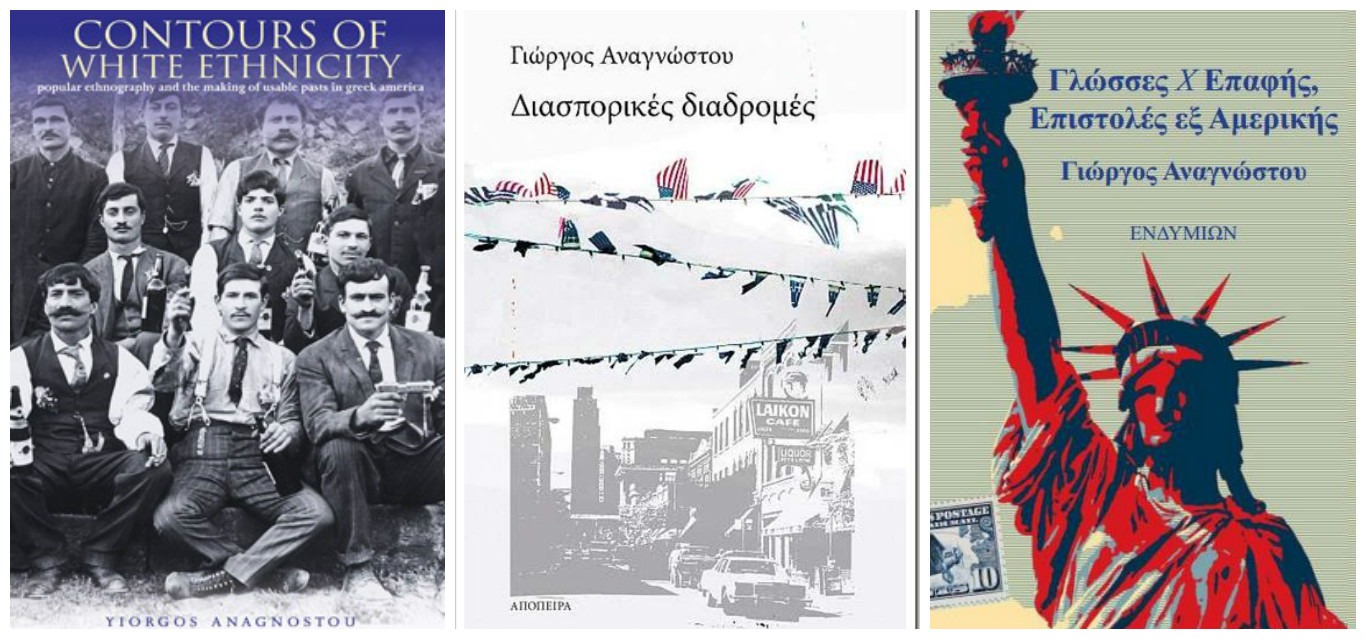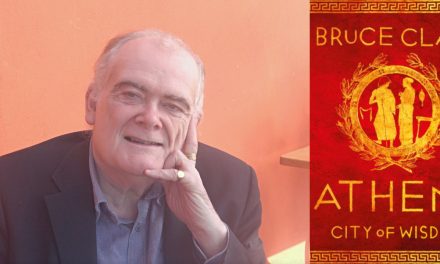Yiorgos Anagnostou is Professor of Modern Greek and American ethnic studies at the Ohio State University. He has published widely on ethnicity and immigration in various scholarly disciplines, including ethnography, folklore, sociology, and diaspora and cultural studies. His latest books and papers include “Contours of White Ethnicity Popular Ethnography and the Making of Usable Pasts in Greek America” (2009), “Διασπορικές Διαδρομές” (Poetry in Greek, 2012), “Re/collecting Greek America: Reflections on Ethnic Struggle, Success and Survival” (Journal of Modern Hellenism, 2015), and «Λόγοι Χ Επαφής, Επιστολές εξ Αμερικής» (Poetry in Greek, 2016).
Professor Anagnostou regularly writes in his personal blogs “Immigrations–Ethnicities–Racial Situations” and “Διασπορική Σκοπιά“ (in Greek) about Greek American Studies, Transnational Greek Worlds, Greek-American literature, and poetry.
Professor Anagnostou spoke with Rethiniking Greece* about the need for empowering Greek American Studies; third-generation Greek America and their “struggle and success” narrative; the encounter of Greek immigrants with U.S. racial hierarchies; American Hellenic identity and various interpretations of classical Greece; and finally the hybridity/syncretism element of the diasporic experience and how it relates to what scholars in Modern Greek studies propose as a fruitful concept through which to understand Modern Greece.
 You have made the case for the development of Greek American studies as a distinct academic field. Why study Greek America? How can this field contribute to discussions about ethnicity and Diaspora?
You have made the case for the development of Greek American studies as a distinct academic field. Why study Greek America? How can this field contribute to discussions about ethnicity and Diaspora? First and foremost, it’s necessary to discuss the significance of Greek American studies in relation to the power structures of the academy. The field generates knowledge about the history and cultures of Greek America, a subject matter whose value is belittled or even utterly dismissed by certain disciplines. For instance, it’s not uncommon for some sociologists in the United States to speak of the assimilation – and therefore somehow cultural irrelevance – of European Americans. Or in contrast, if scholars of ethnic and racial studies happen to display an interest in this subject, it tends to focus on the ways immigrants from Europe and their offspring contribute to structures of racial oppression. Yet work produced in a spectrum of genres, from autobiography to fiction, from poetry to film to community activism, not only introduces unique Greek American narratives, signaling a sort of cultural vitality, but many of these narratives also specifically critique and challenge racial hierarchies within American society.
All-in-all there is a shortage of currency for Greek American studies in the academic marketplace, both in the United States and Europe. As I have written elsewhere, Greek America is neither exotic nor culturally thick enough for anthropology; it is too cultureless or anti-minority for ethnic studies; not multilayered enough for literary studies (unless a Pulitzer prize turns it into American literature); not textured enough for film studies; not adequately victimized for academic multiculturalism. For these reasons it has only been allotted a narrow space within the University, endangered now in an environment of fiscal constraints.
Safeguarding an institutional space and devising strategies to empower this field is therefore vital. Without Greek American studies, who will place Greek America at the center of research projects? Who will illuminate it using angles that established disciplines overlook? The field, engaging critical debates and versed in “scholarly imagination,” has much to contribute to work concerning diasporic identity, postethnicity, usable pasts, translingualism, citizenship, and cultural syncretism, among other topics.
Also, in the context of the Greek debt crisis, dense flows of capital, expertise, and human resources continue to enrich the existing transnational terrain comprised of the United States, Greek America, and Greece. Greek American studies is positioned to contribute to the understanding of this phenomenon.
There is also the question of the links between Greek American and Modern Greek studies. Because of the transatlantic dimensions of its subject matter the former field presses for the transnational orientation of the latter; Modern Greece cannot be understood in disconnection from Greek America. Their transnational interconnections include regional societies, remittances, humanitarian relief at times of crisis, heritage tourism, political advocacy, US Modern Greek studies programs, film production, poetry written in the US in Greek and poetry written in Greece in English, academic collaborations, and economic partnerships. In addition, there have been several examples where fiction and photography intertwine American and Greek literary and visual perspectives respectively. This framework of course should also include wider US–Greece linkages. For this reason, Greek American studies shifts the scope of Modern Greek studies from nation-centric to transnational. In the United States, the call to transnationalism brings the two fields under the common academic rubric of Modern Greek programs, which, given the realities of the academic marketplace, enables a strategic coexistence. This alignment eschews further fragmentation, a necessity given the already limited human and institutional resources. The dwindling of academic spaces for practicing Greek American studies – the grave scarcity of jobs of Greek Americanists is ominous – magnifies the urgency to exclusively promote this field. It is in this context that I have made the case for endowing chairs or creating research institutes devoted to the study of Greek America, not unlike what Italian Americanists have admirably accomplished in their respective field.
 Do third-generation Greek Americans still have a distinct ethnic identity? What does being Greek American mean nowadays?
Do third-generation Greek Americans still have a distinct ethnic identity? What does being Greek American mean nowadays?Our understanding of third-generation Greek America is rather skewed and certainly limited. Sociologists have mostly documented rates of language loss and Greek cultural attenuation while registering, however, the persistence of Greek identity. But it is necessary to explore this identity beyond approaches that measure it in relation to generational distance from the immigrant culture. The youth population reinvents identity in unexpected ways, including use of satire and irony. It combines and recombines cultural forms, vehemently rejecting certain immigrant pasts, parodying some, creatively appropriating others. The complexity of these cross-fertilizations requires matching conceptual sophistication from those who undertake work on this topic, whether academics, authors, journalists, or filmmakers. It is encouraging that Greek and European foundations allot precious funds to writers for research on this topic; I had noticed a wave of support late in the first decade of 2000. We are still waiting for the results of these projects, and I want to assume that the delay in actual publications stems from a sense of critical responsibility from the part of grant recipients to portray the next generation as responsibly as possible. Time will tell.
Another interesting development is that a vast institutional investment has been put in place to promote and shape Greek American identity among the new generation, connecting Greek American political and cultural figures with Greek American youth. The project, parts of it available online, documents narratives of identity; it links entrepreneurialism with heritage; it brings into the fore questions of leadership and cultural preservation; and it sponsors study abroad heritage programs in Greece. But it’s important to note that though the initiative is promising in many ways, it also regulates the boundaries of identity when it privileges certain versions of cultural expression and sidelines others. Many members of the Greek American community, young and old alike, for instance, contest overly idealistic or canonical representations of Greek America. The controversy over the MTV show “Growing up Greek” in particular alerts us to internal disagreement (within Greek America) over the meaning of this identity. Challenges to the scripted identity of the family-oriented, religion-centered youth are not uncommon. To return to your previous important question, if Greek American studies does not engage this immensely political cultural field, who will?
 You have mentioned that “in addition to ethnicity, racial issues also shape Greek American lives.” Can you tell us more?
You have mentioned that “in addition to ethnicity, racial issues also shape Greek American lives.” Can you tell us more?The United States’ history is racially charged, and it is impossible to extricate issues of difference, otherness, and assimilation from racial issues. We cannot speak of Greek America as a diaspora without examining the larger issues of belonging in the host society, in which race and ethnicity play a key role, not only historically but also in the present moment. Race therefore enters Greek America inescapably. Thanks to “whiteness studies,” a field of inquiry that examines the centrality of the social construction of race in the immigrants’ Americanization process, it is no longer viable to examine American ethnicities solely in terms of culture (values, beliefs, expressivity). Instead a key question is how and why immigrants from Europe largely aspired to or resisted “whiteness” – the power and privileges conferred to people ascribed as whites within a hierarchical system of racial classification. The encounter of Greek immigrants with U.S. racial hierarchies in the early twentieth century and the ensuing negotiations to enter, consent, turn a blind eye, or in some cases challenge whiteness speaks volumes about the importance of race in Greek American history. At stake in these negotiations were privileges associated with the right to citizenship, union membership, access to middle-class white neighborhoods as well as social networks of power, including intermarriage. Not many Greek American cultural producers – academics, filmmakers, journalists – venture to explore this politically loaded terrain.
The question of race must be raised because it speaks to how the social power of whiteness has shaped the experiences and histories of various people differently. To mention one example of race as a mechanism of differential exclusion, Asian Americans were granted naturalization rights – and the political power that derives from this legal status – decades after this privilege was granted to southeastern European immigrants. Understanding the disadvantages of non-whiteness is necessary to complicate the simple claim that all immigrant groups faced similar challenges and therefore their “struggles and successes” must be evaluated using similar criteria.
Enjoying the privileges of whiteness, Greek American lives today are largely unencumbered by discriminatory practices. They are spared, as a result, the emotional, psychological, and social burden associated with the microaggressions and often overt violence to which African Americans, for instance, are subjected daily. This privilege entangles Greek American lives with other people’s lives in an ethicopolitical manner. As citizens who have experienced stigmatization in the past, Greek Americans are more urgently obliged to take a stand on the problem of Black lives still being battered by racism. Making race a component of Greek American scholarship is one way to responsibly explain interracial issues. But this political territory remains under-researched.
 It has been recently argued that the dominant “struggle and success” story for Greek Americans obscures other narratives that focus on class and gender. How can we re-conceptualize Greek American identity after these critical elaborations?
It has been recently argued that the dominant “struggle and success” story for Greek Americans obscures other narratives that focus on class and gender. How can we re-conceptualize Greek American identity after these critical elaborations?As a cultural myth, the idea that values of perseverance, endurance, and hard work (struggle) alone lead to socioeconomic mobility (success) permeates Greek American self-representation. The popular imagination commonly takes this truth as self-evident. Doesn’t it accurately reflect, many argue, real heroic sacrifices to realize a measure of middle-class comfort out of dire immigrant poverty? Canonical historiography organizes the telling of Greek American history accordingly. Cultural studies, however, interrogate this reasoning because of its ahistoricity, and its power toerroneously shape how the public understands poverty, particularly race-based poverty.
The narrative appears innocuous and is celebrated, but it in fact functions as a pernicious ideology. It hides the structures that prevent mobility (racism, class-specific unequal distribution of resources), and in doing so implicitly blames the poor for their own plight. In fact, as scholars show, this Horatio Alger story contributes to the power of whiteness by explaining poverty among people of color as a result of their (supposed) cultural deficiencies. Those who have failed to escape poverty, the reasoning goes, have only themselves to blame. When we elevate the model white ethnic American family as a success story we implicitly, without even mentioning other races, subordinate the poverty-stricken African American family, which is then seen as dysfunctional and pathological. Race appears invisible when in fact it imbues the narrative.
Bringing into focus how lack of mobility is a function of class inequality obviously challenges the myth of struggle and success. Expanding the analysis to include how gender and race intersect with class offers a richer understanding of the issue. Demonstrating how the struggle and success narrative works to injure vulnerable populations urgently calls for us to rethinking how to best represent Greek American identity in a politically responsible manner.
If the variables of class, gender, and race complicate the notion of “struggle” (who struggles, in what context, and under what conditions), the focus on gender has also been utilized to complicate the notion of “success.” The immigrant narrative of success as socioeconomic mobility is a male one. Women, in contrast, speak of success in terms of civic and community contributions, offering alternative ways to imagine citizenship. Re/collecting Greek American history along these lines, as I have recently written, will expand the ways in which we speak and practice Greek American identity and citizenship.
How have American ideals related to ancient Greece become important in the formation of the Greek American identity?
The initial encounter of Greek immigrants with American modernity included the experience of this modernity’s embracing of Greek classical ideals. The recognition that the host society values a heritage so central to the Modern Greek identity provided a historical opportunity for the immigrants to claim a fundamental compatibility between Hellenism and Americanism. Thus the subsequent forging of an American Hellenic identity early in the twentieth century reconciled the two, advancing the claim of the fundamental Greek immigrant belonging in the United States at a time of rampant nativism that dismissed the Greeks as incompatible with the American polity. The classical past, in all its positive, erudite and prestigious associations, serves as invaluable cultural capital to Greek America and therefore an enduring core identity. What interests me about this question, though, goes beyond the classical past as a source of distinction and ethnic pride. Literature and film feature Greek American characters who draw from the classical heritage to position themselves against class exploitation and issues of social justice. This political reading of the classics is worth pursuing in scholarship to investigate how various interpretations of the classical may inspire citizenship as duties and obligations to a collective. This is a significant counter-narrative to the proliferating narratives that promote citizenship as personal fulfillment and entrepreneurialism.
 How do you understand “diaspora”? What is the place of hybridity in the diasporic experience? How can we rethink Greece, Greek America, and the transnational through diasporic hybridity?
How do you understand “diaspora”? What is the place of hybridity in the diasporic experience? How can we rethink Greece, Greek America, and the transnational through diasporic hybridity?The way we experience diaspora depends on a variety of factors: our larger communities, our socioeconomic status, our education, our ideology, and our interactions with members of different cultural backgrounds. But we are often in one place with an awareness, whether implicitly or explicitly, of the other. Some might speak about this position as “inhabiting two cultures”; of cultivating connections with the historical homeland while making a place for oneself in the host society.
This experience of relating to two places may bring about ambivalences, internal clashes, and cross-fertilizations. A diasporic perspective focuses attention on these tensions. It makes visible the process of negotiating two cultural affiliations, which often entails not only adherence to cultural intimacies but also cultural rejections, as well as selective retentions and the mixing of disparate elements. Intense cross-cultural contact, as I mentioned, is an integral component of the diasporic condition. It may entail playfulness and creativity, but it may also provoke anxiety and deplete vast energies. But it is productive, in the sense of making something anew and therefore opening ways of understanding and inhabiting the world differently.
The diasporic perspective probes us to reflect on situations wherein elements from two (or more) different cultures coexist. In this context I am very much interested in the question of agency: how one person or an institution grapples with this terrain to shape its expression, direction, and boundaries. This is a dynamic process and, I should add, a political one, always historically specific. Bringing two languages into tension with each other, as in a bilingual poem, for instance, may function as an adversary to narratives demanding linguistic or national purity or to ideas positing culture as a seamless whole. In hosting multiplicity simultaneously, the diasporic resonates with syncretism, the tense co-existence of disparate elements, a wider process that scholars in Modern Greek studies propose as a fruitful concept through which to understand Modern Greece. Some use syncretism and hybridity interchangeably but others object to this conflation.
It must be clear that understanding the diasporic in a syncretic manner decisively departs from the view of the diaspora as the organic extension of the nation. The latter is a nationalistic reading that homogenizes and biologizes diaspora as omogeneia. It obviously promotes sameness. It cancels out how the diasporic is dissimilar from the nation, and hides the internal heterogeneity of a diasporic collective. It also obliterates a diasporic subject’s possible multiple cultural affiliations and open-endedness.
It would be rewarding to reflect on your question by considering how the diasporic position could inflect our rethinking of Greece and Greek America. Let me preface my answer though and say that any conversation along these lines should take as its departure point the view of Greek America as a cultural formation in its own right, not as lesser Greek, not as non-authentic Greek. When Greek Americans in Greece display politeness in public, keep one’s place in the queue, and refrain from littering – and then expect the Greeks to do the same – they are often dismissed as paternalistic “Amerikanakia.” Working against narratives of purity, a diasporic position in Greece would have situated this Greek American civic ethos as an object of deliberation, of public conversation. Or even incorporate it as a component of the education curriculum to agonistically coexist with cultural forces that oppose it.
The diasporic perspective as syncretism is already present in Greek music, language, cuisine, literature, and the arts overall. The question of making the Greek diasporic central in the rethinking of Greece invites inquiry on the ways in which it operates and the ways it is expressed: where, and to what end. The way it specifically manifests itself in the arts, popular culture, and people’s lives, and who promotes its expression and, in turn, who opposes it. A public discussion on how these issues play out at an institutional level will be useful. How might the educational system, literature, the media, museums, and the academy imagine the circulation of the diasporic in Greece and Greek America? To what extent, for example, could a cultural history – or a genealogy – of Greek transnational literature, be incorporated into Greek and Greek American curricula? Transnational collaborations among authors, scholars, artists, and institutions offer a route to amplify the circulation of the diasporic perspective. This is a cultural project, raising the issue of institutions opening up to the idea of the diasporic, and as such, it presents itself as an agonistic terrain.
*Interview by Ioulia Livaditi
Here’s some songs from and a profile of Greek-American band Annabouboula taken from a BBC documentary made in the late 1980s, early 1990s on what various ethnic groups were up to musically in New York City at the time. The first song Annabouboula plays is the classic rembetika/Smyrnaic song Lily Skandalaria (Scandalous Lily), composed by Panayiotis Tountas and originally sung by Roza Eskenazy:
Read also: Immigrations–Ethnicities–Racial Situations: Annabouboula and NYC’s Greek Musical Scene
TAGS: EDUCATION | GLOBAL GREEKS | MIGRATION














